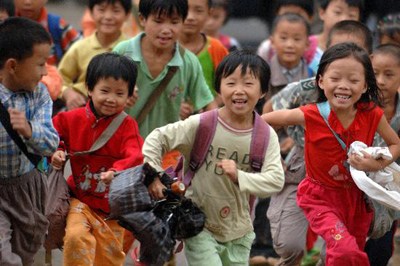(Ecns.cn)--A Proposal for Migrant Children Access to College Entrance Examinations surfaced on October 29, written by parents living in Beijing without Beijing hukou, or permanent residence permit. The civil proposal recommends the hukou limit, that determines who can and can't take college entrance examinations, be abolished, and that student status and parent's residence be considered as qualifications for offsite college entrance examinations.
Five days earlier, 15 citizens delivered a joint letter to Premier Wen Jiabao, appealing for the cancelation of hukou restraints on prospective college students. Zhang Qianfan, a professor at Peking University, and other experts from tertiary education institutions, are among the petitioners.
Both events were bound to trigger another round of public discussions on migrant status issues, particularly surrounding the social implications of migrants' offspring taking college entrance examinations. Some optimists voiced the hope that "letters from scholars" and "civil proposals" may lead to the dismantlement of the college entrance examination system, and even promote innovative alternatives to the hukuo, or residence registration system. However, the response from the education ministry is ambiguous: the proposal is "under investigation, but not on the agenda."
Equal rights advance 200m migrants
Among the 220 million floating population, the majority are migrant workers attracted to developed areas such as Beijing, Shanghai and the Pearl River Delta. When the reform and opening up policy was launched over 30 years ago, migrant workers emerged as a social and economic phenomenon. Despite being politely described as 'new citizens" and taxpayers in their locality, this floating population has been barred from the same basic services enjoyed by local residents.
Taoyuan is a migrant and an activist for educational equity for this class of workers. For now, she has accepted the reality that her child will sit the college entrance examination for the second time in her home town, but still, she contributes her efforts to the "civil proposal" mentioned above, "So others may not have to experience such sad conditions."
Taoyuan and her husband came to Beijing for the sake of their careers in 1996, and gradually settled down after buying an apartment and a car there. Their child has been attending school in the city since 1999. Until March 2011, the child's first semester of the third grade in junior high school, he has had to return to his hometown because he is not qualified to take college entrance exam in Beijing. The child failed the college entrance examination held in June 2011, because the textbook used by his hometown in Shandong province is different from that of Beijing.
Taoyuan's son is now back in his hometown preparing for the college entrance examination of 2012, and his father had to quit his job to accompany him. The more than 400,000 migrant children who live in Beijing with their parents potentially face the same situation and choices.


















